Get your resume certificate
✓ Take International English Test
✓ Assess your English Language
✓ Get your English certificate
⭐ ⭐ ⭐ ⭐ ⭐
International English Test is a fast and accurate assessment of your English proficiency to get a certificate immediately.
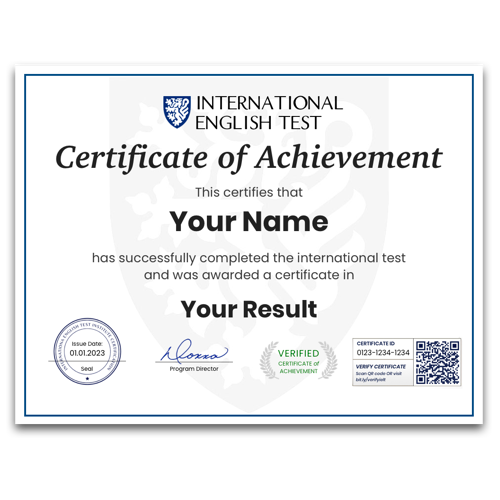
Resume certification example
You should create a dedicated resume section to list your certifications.
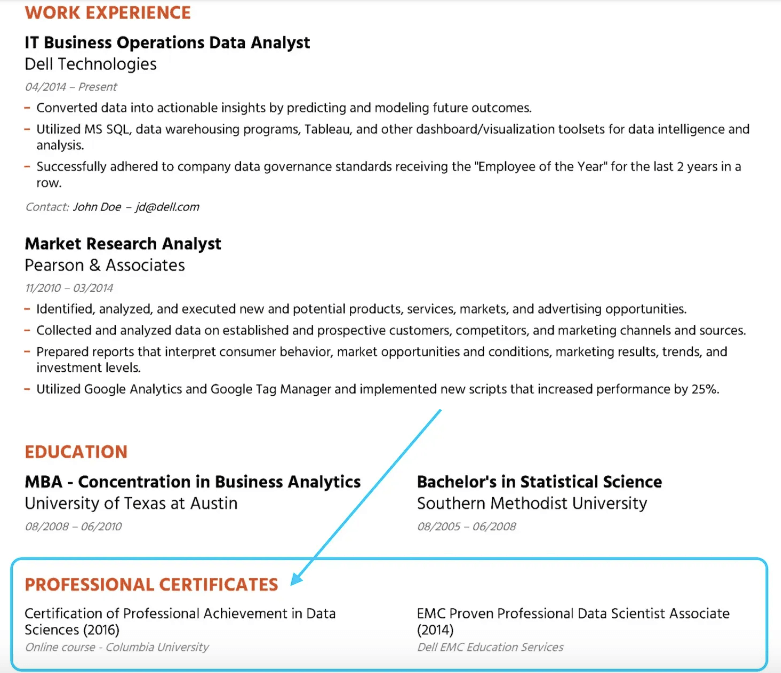
What is resume certificate?
Resume certificates are official credentials granted by recognized institutions, such as boards, associations, or professional organizations.
Acquiring a certification indicates that you have acquired or developed a specific skill or achieved a particular level of technical expertise.
To obtain a certification, you usually have to meet specific requirements and criteria, pay a fee, and in some cases, pass an assessment test. The more challenging a certification is to obtain, the more advantageous it can be in setting you apart from other job applicants.
What is your English level?
Find out your A1 A2 B1 B2 C1 C2 level of English with our quick, free online test.
Why are certifications important on resumes?
- The employer demands it
This is likely the primary reason why it is crucial to include certifications on your resume – they are essential for the job. - To showcase your skilss
In some cases, a certification may not be mandatory for the job, but it can still be highly beneficial to include in your application as it demonstrates your skills. - To emphasize your expertise in the field
An additional compelling reason to include your certifications in your resume is when they can enhance the recognition of your extensive industry knowledge and experience. - To compensate for limited hands-on experience
Certifications can also serve as a way to offset the absence of practical work experience.
How to List Certifications on a Resume
Now that you have a comprehensive understanding of certifications and their advantages for your resume, it is essential to learn the proper method of incorporating them into your resume:
How to Structure Your Certifications In the majority of cases, it is advisable to dedicate a specific section in your resume for listing your certifications.
Here’s how you can format such a section:
- State the certification title: Begin by including the full title of the certification under the section header as a bullet point. Ensure that there are no spelling errors and that any abbreviations are spelled out.
- Mention the awarding organization: Include the name of the organization or institution that awarded the certification. This adds credibility to the certificate. Double-check for any spelling mistakes.
- Specify the certification date: Provide the date when you earned the certification. If the certification requires renewal, include the date of the most recent renewal. For certifications you are currently pursuing, mention the anticipated date of completion.
- Indicate the expiration date (if applicable): If the certification has an expiration date and you have not renewed it yet, mention the expiration date. It’s important not to include expired certificates on your resume.
- Provide additional details (optional): If space permits (remember, it’s ideal for your resume to be one page long), you can add a sentence describing the relevant skills associated with the certification. This helps the hiring manager understand its relevance to the job.
CV Certificate
Are you C1 Advanced English?
Get your C1 Advanced English certificate now!
✓ Add your certificate to your resume
⭐ ⭐ ⭐ ⭐ ⭐
Where to Include Certifications in CV
There are multiple sections in your resume where you can incorporate your certifications. As previously mentioned, the most common approach is to include them in a dedicated “Certifications” section.
Alternatively (and depending on the significance of the certification for the job), you can also include them in the following three resume sections:
Resume Certification Section:
- Resume Summary: You can mention your certifications in the resume summary or objective statement at the beginning of your resume. This provides a quick overview of your qualifications and can make a strong initial impression.
- Contact Information: Another option is to include relevant certifications next to your contact information. This can be a concise way to highlight your credentials right at the top of your resume.
- Education Section: If the certifications are closely related to your educational background, you can incorporate them within the education section. List them along with your degree or diploma, indicating the awarding organization and dates earned.
Examples of Certifications on Resumes
Here are a few examples of certifications included in resumes for various positions, using our proven resume templates:
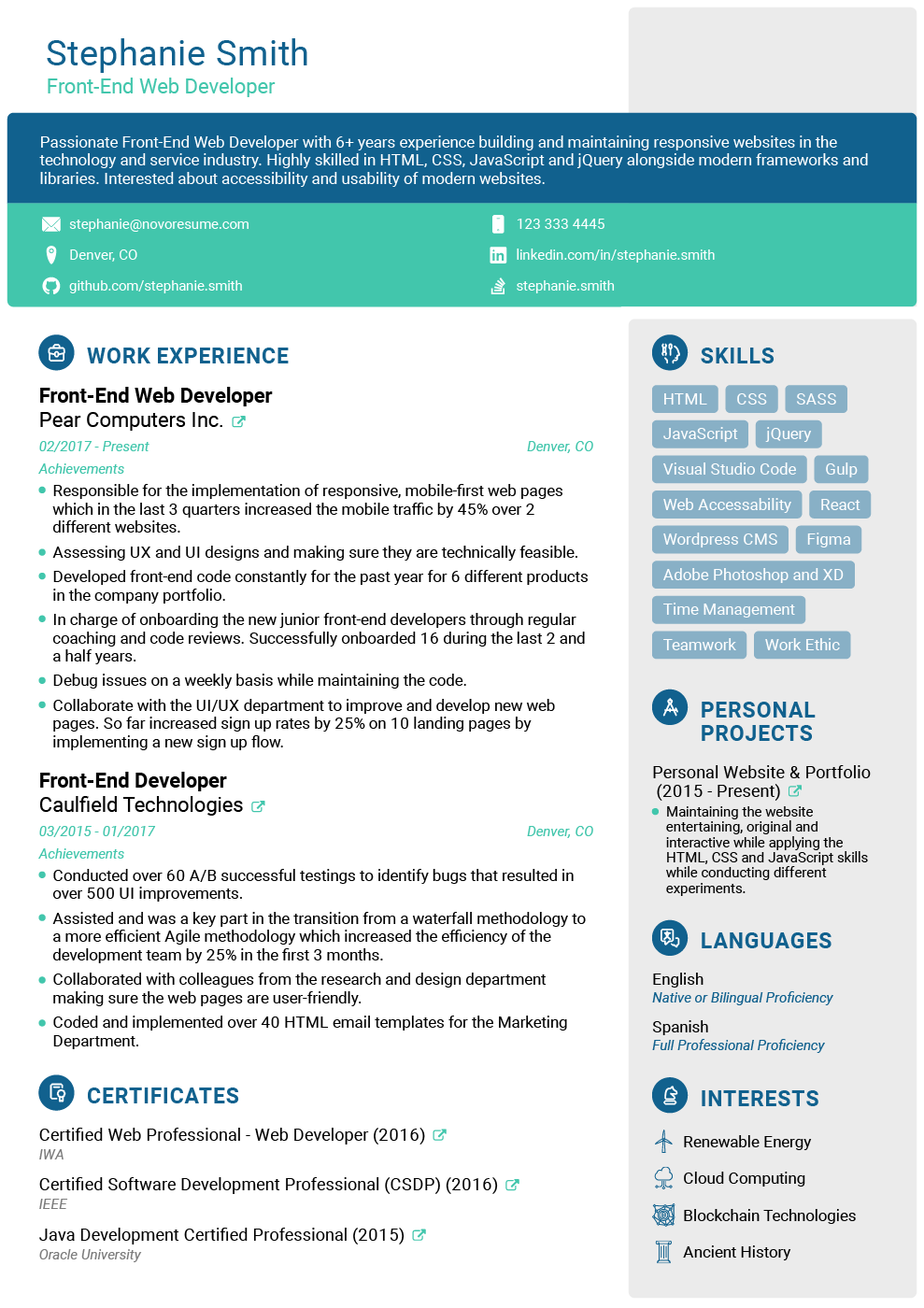
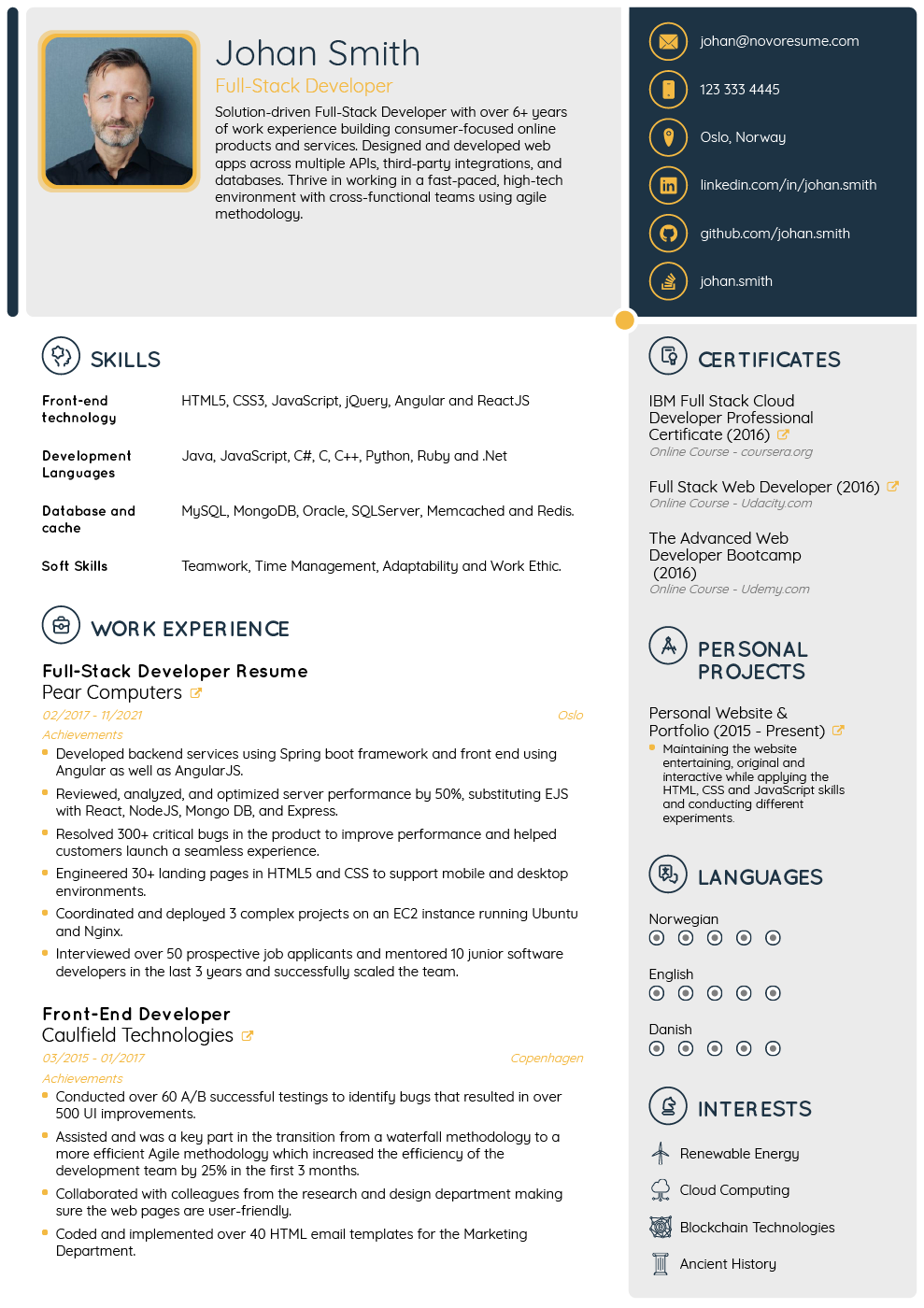
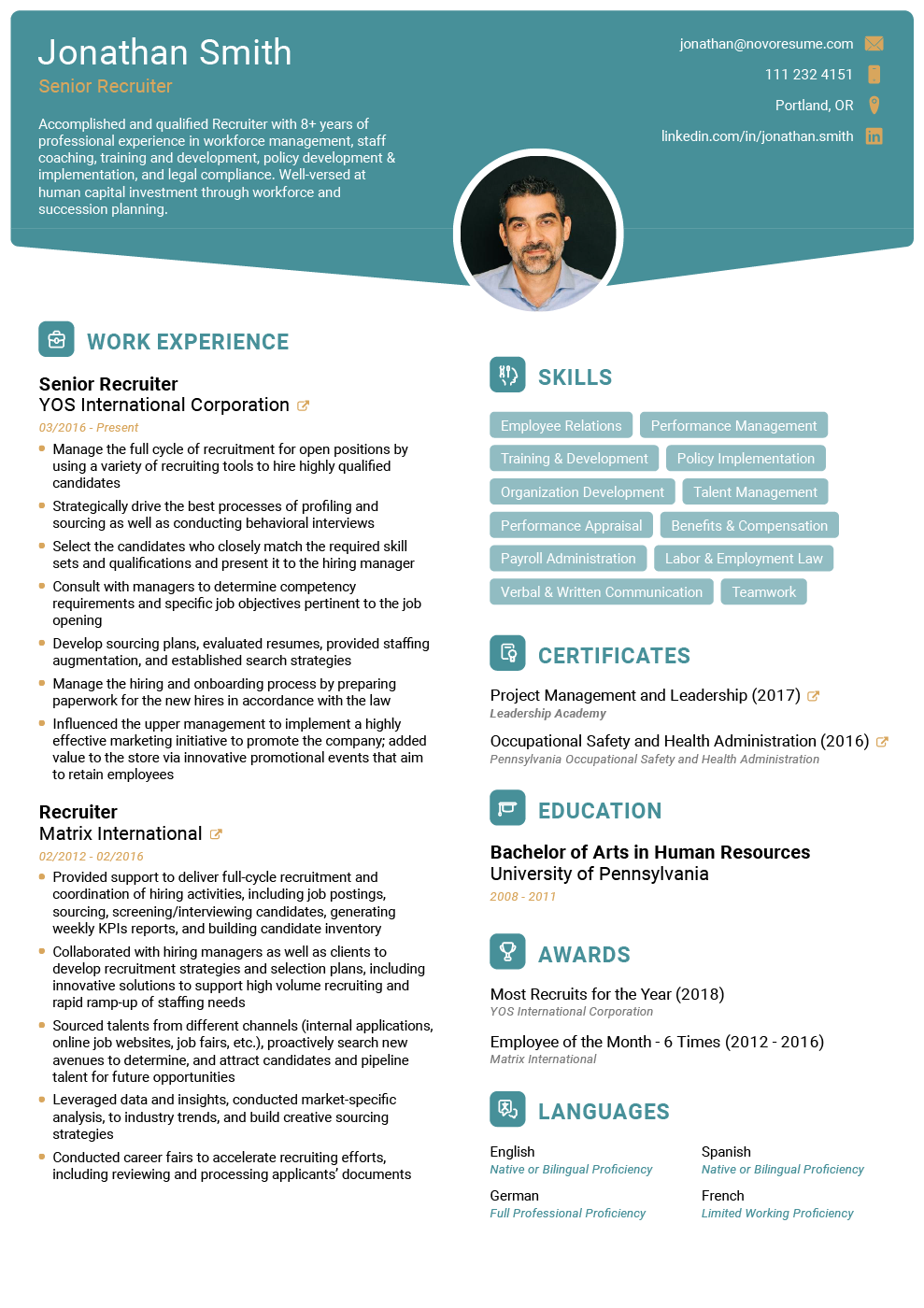
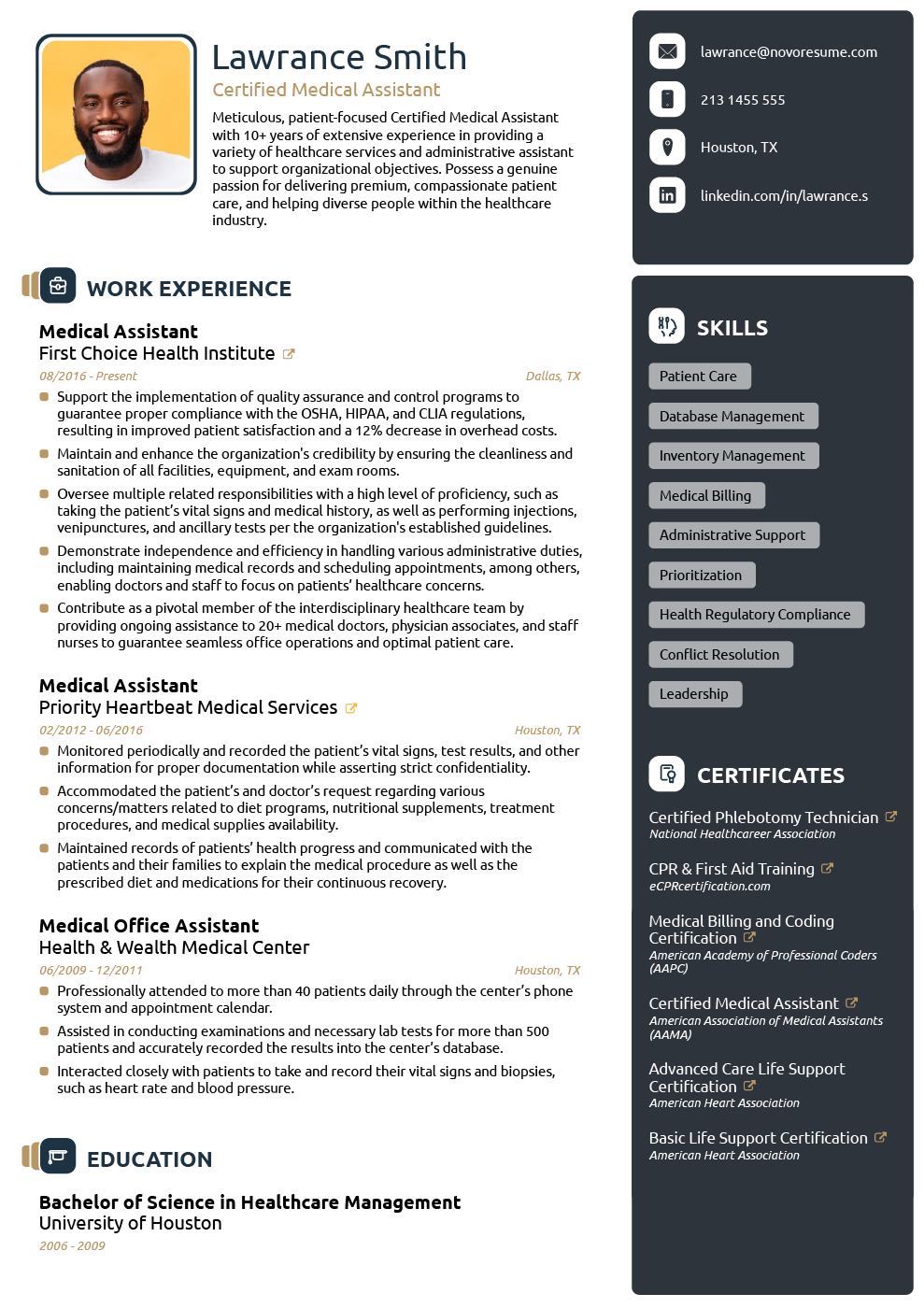
10 Top Certifications That Can Boost Your Career
Certainly! Here are ten highly regarded certifications that can significantly boost your career:
- English Certificate: Get an English certificate and show your english language proficiency.
Test Your English Free - Project Management Professional (PMP): A globally recognized certification for project managers, demonstrating expertise in project planning, execution, and management.
- Certified ScrumMaster (CSM): A certification that validates knowledge and skills in Agile project management, particularly in the Scrum framework.
- Certified Information Systems Security Professional (CISSP): This certification confirms expertise in information security management, covering areas such as risk management, cryptography, and security operations.
- AWS Certified Solutions Architect: A certification that demonstrates proficiency in designing and deploying scalable and secure applications on the Amazon Web Services (AWS) platform.
- Cisco Certified Network Professional (CCNP): This certification validates advanced knowledge and skills in planning, implementing, and troubleshooting complex networking solutions.
- Certified Financial Analyst (CFA): A globally recognized certification for finance professionals, signifying expertise in investment analysis, portfolio management, and financial planning.
- Six Sigma Green Belt: A certification that demonstrates competence in process improvement methodologies and data-driven problem-solving techniques.
- Professional in Human Resources (PHR): This certification validates expertise in various HR disciplines, including employee relations, compensation, and talent acquisition.
- Microsoft Excel Certificate: A certification that showcases proficiency in managing and administering Excel.
These certifications can enhance your knowledge, skills, and credibility in their respective fields, giving you a competitive edge in your career.
What is your English level?
Find out your A1 A2 B1 B2 C1 C2 level of English with our quick, free online test.

